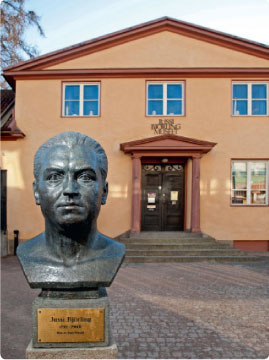Jussi of the Month January 2019
Jussi was proud of being of Finnish descent and he visited Finland on numerous occasions. During the war he sang at charity concerts several times and in 1951 he was happy to meet Sibelius at his home in Ainola, outside Helsinki. After all the long tours for many years, not least across the North-American continent, he was at times rather tired of travelling, but to Finland he always travelled with pleasure, as he told a Finnish journalist. In January 1955 he had an opportunity to return to “the land of the thousand lakes”, but before that he was booked for a Tosca performance at the Stockholm Opera on 14 January.
The reviewers were moderately delighted with the choice of repertoire. Stockholms-Tidningen’s Lennart Swahn resorted to strong measures: “Jussi Björling sang his Cavaradossi on Friday night for the umpteenth time, which the opera manager would not like to remember. It is by all means utterly attractive to hear Jussi in the same role over and over again and find that he is as he usually is and thus there is no need to review him, but it is much more unattractive that the assumption is reasonable that the opera management definitely has decided to limit Björling’s narrow Stockholm repertoire to two or three tenor “Golden Eggs”. You’ve heard it before! Of course, but maybe the drops some time will hollow the stone at Gustaf Adolf Square and give us Jussi in an edition that we don’t know upside-down.” After this volley Swahn rounded off his article laconically: “Birgit Nilsson supported both Jussi and Sigurd Björling in her soon world famous manner. A good performance accordingly.”
Similar strains were heard from several of his colleagues. “The Royal Opera are seemingly gaining strength for a series of great achievements to judge from the fairly one-sided diet they have offered lately. No one, I suppose, wants to deny the management the pleasure of basking in the Carmen success – the perpetual reprising of an old Tosca production, on the other hand, doesn’t seem very justified. That opera isn’t even in the taste of the public – it is too shabby”, was the verdict from one of them. But by that his lament was over and he eulogized the vocal splendour that poured out from the stage. And the others agreed.
One or two days before the performance Jussi must have read in Aftonbladet about the paper’s referendum “This year’s Swede”. Heading the list of the 10 eligible candidates was Jussi. Among the others were Dag Hammarsköld, Secretary-General of the United Nations, and Herbert Olivecrona, professor and brain surgeon, credited with founding the field of Swedish neurosurgery, and pioneering developments in modern neurosurgery. On 10 January Jussi was introduced to the readers in a long article written by his son Anders, having recently passed his high school graduation.
On the flight to Helsinki on 17 January it is possible that Jussi was reading the latest issue of the Nutid magazine, where he was cover-boy and also was portrayed in a big, lavishly illustrated article of more than four pages.
In the Finnish capital he gave a concert on 18 January and the reviewer of Hufvudstadsbladet (Swedish-language newspaper) waxed lyrical: “Jussi Björling’s concert before a sold-out B-exhibition hall, turned out to be a resounding success. The audience paid tribute to the singer with thundering ovations, which resulted in numerous encores, both in the middle of and after the programme. Among these can be mentioned the two Sibelius songs, Säv, säv, susa and Demanten på marssnön and of course Sjöberg’s Tonerna, which was a request. The programme contained opera arias, songs by Schubert and Richard Strauss, a Nordic section represented by Grieg, Svedbom and Nordquist and a couple of popular pieces by Italian Tosti.
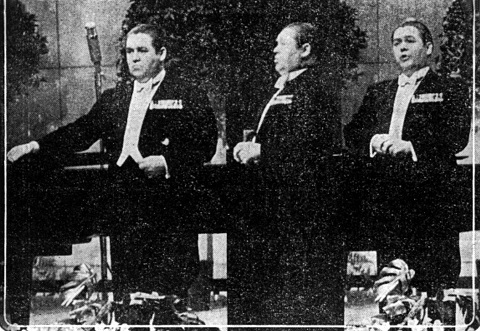
Consert 18 January 1955 in B-Mässhallen Helsinki
Abundantly one could admire the legato singing, which in even and serene arcs flowed in a wide stream of golden harmony. And this broad, beautiful legato was emphasized by the often drawn out tempos. The soft, warmly shimmering voice sounded and equilized throughout the register. With refinement and impeccable enunciation he presented his programme. Balanced and without sentimental exaggerations. In Gustaf Nordquist’s Till havs there was dramatic nerve and power that was strongly overwhelming. He was assisted at the concert grand by the confident and flexible Harry Ebert.”
Click here to listen to "Tonerna" in B-Mässhallen 18 August 1955
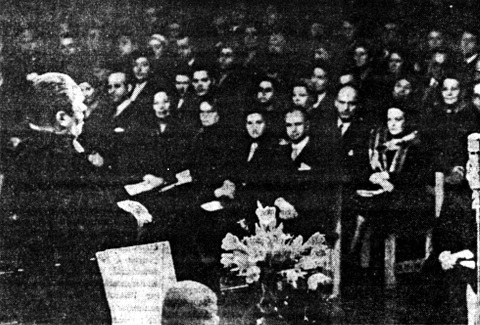
B-Mässhallen Helsinki 18 August
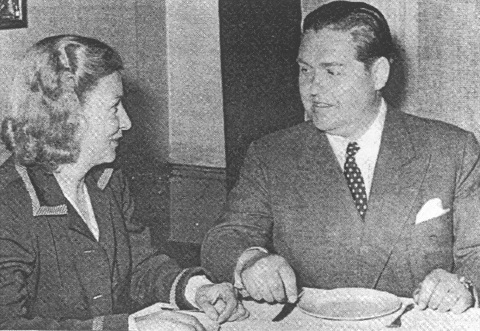
Anna-Lisa and Jussi in Helsinki 18 August 1955
Bengt Janzon from Dagens Nyheter took part in the trip and joined Jussi and Anna-Lisa on their journey to Tammerfors on 20 January: “On Thursday Jussi gave a concert in Tampere (Tammerfors). A shaking, none too comfortable train – where the lunch symbolically was an “opera sandwich” – brought the tenor and company in northwestern direction in three hours up to Tammerfors, the town where Jussi’s Finnish grandmother met and married his Swedish grandfather. Jussi sang in the theatre of the town and donated the proceeds – 10 000 SEK – to the war crippled.” In the local paper one could read that the theatre only takes 600 listeners and added: “That interest was great for Jussi’s visit can be concluded from the fact that thrice as many queued for tickets.”
On 23 January Jussi was back in Helsinki and sang at the Finnish Opera. On the programme was – Tosca! But the reviewers were all sunshine. The performance was conducted by Jussi Jalas – son-in-law of Sibelius – chief conductor of the opera, and he was highly commended. The reporter of Hufvudstadsbladet wrote about Jussi: “From the warm applause at his first entrance to a good half-dozen curtain calls after the final chord the audience were in a state of expectant excitement. And there were reasons for that. The first act didn’t give full proof of more than that the singer has an ideal voice with all that schmelz one can demand in a grateful role, but in the second act the stage was all aglow. Such intensity of expression, such intoxicating flush of victory in the freedom song one has almost forgotten that it can exist, and for natural reasons it can rarely be heard on the concert platform; but his warmth and his softest tones the singer presented in the last act’s farewell aria and the song to the soft hands (O dolci mani). It was, in other words an all-embracing exposition of his eminent capacity the singer generously offered. – One could criticize Puccini for not anticipating a Jussi Björling and writing a longer tenor role …” The reviewer also praises Elli Pihlaja in the title role and Lauri Lahtinen as Scarpia – both evidently inspired to great achievements by Jussi’s presence. “We have to be grateful to Jussi Björling for this visit”, he finished his review, “and that he by no means regards this little stage as something inessential: he delivered to the full and shared generously the ovations with his moved and curtseying prima donna.” This was also something the reporter from Stockholms-Tidningen had observed: “[Jussi Björling’s] popularity was further increased, when he chivalrously shared the profusion of applause with Ella Pihlaja, who in spite of commendable attempts to escape was resolutely captured by Jussi.”
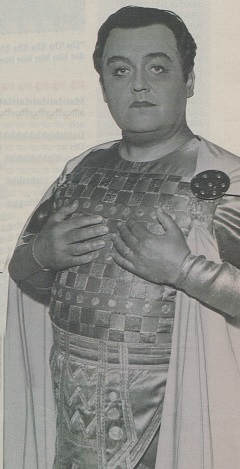
Jussi as Radames in Aïda, August 1955
“The Royal Opera took out the Crown Jewels on Thursday night. Aïda was furnished with four Royal Court Singers, besides the fact that the opera itself keeps two kings and two princesses. It was in other words a vocal feast with few equivalences lately and which may be written on the few golden pages the present opera
management seems to get in the annals.
In the Court Singer Quartet was Jussi a visiting glorious Radamès but slightly baker-like as the bold commander of the Egyptian armies. His natty rotundity takes away the illusion a great deal – no doctor can help that – but instead we have one of the freshest and most alluring voices to admire. The vocal perfectionist Jussi is one of the wonders of today and when he is matched with the loyal Birgit Nilsson one is not far from the seventh Heaven of Song. Is there any vocal stage in this world that can display a better Aîda constellation than this pair. Leon Björker’s Pharaoh is mighty as – yes, exactly as Pharaoh himself and Sigurd Björling has everything one can ask for from Amonasro: wily, just enough dramatic and big-voiced. He catches interest as soon as he comes in and glares angrily at the crowd in the triumphal act - - - It isn’t easy to be a world tenor when one has a world soprano by one’s side, but Jussi is as we know a cordially generous character. Sometimes he tore himself away at the curtain calls and implored Aïda to take a bow alone when the cheers poured abundantly across the footlights this evening. They certainly deserved it, for this was an event of the non plus ultra type.”
Click here to listen to "Celeste Aïda" from a studio recording 1955
After all these ovations it probably must have felt like a non-event to go to the opening ceremony for the annual congress of The Swedish Society for the Promotion of Ski Sport and Outdoor Life in Sundsvall. It was cold as sin in Central Square when Jussi sang at the opening ceremony. On the other hand it was most likely more pleasant in the Town Hall in the evening, where Jussi and Anna-Lisa, with Harry Ebert at the piano, sang in connection with the festival banquet. And as a further consolation they had the privilege be the first to spend the night in the newly renovated de luxe suite at legendary Hotel Knaust!
Göran Forsling




